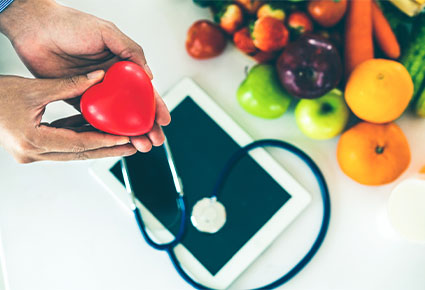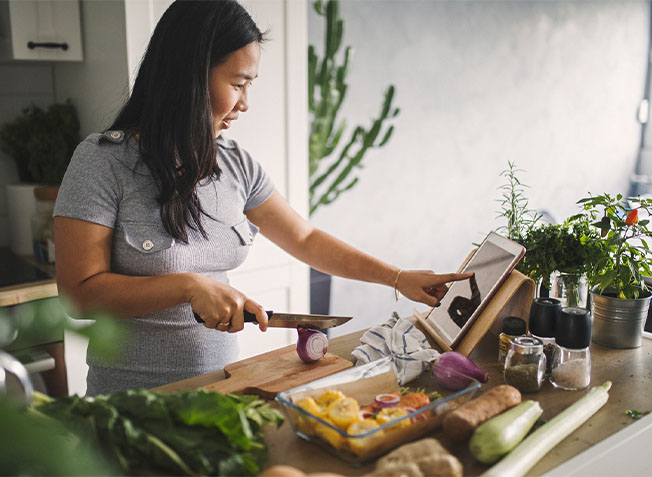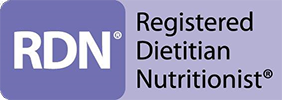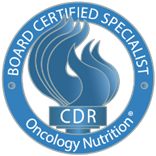Oncology Nutrition

Proper nutrition is essential before, during, and after treatment. You will find that fueling your body with the right nutrients adds strength and helps you at every step. In fact, it can make a big difference in how your body reacts and recovers.
What should I eat during treatment?
If you have a good appetite and are not experiencing any side effects, you can follow the nutrition recommendations found in the ‘What should I eat after treatment’ section. Some people experience side effects during treatment that make it difficult to eat well.
Cancer and cancer treatments may cause your mouth and/or throat to become sore or tender.
Try these tips:
- Choose soft, moist foods. Examples can be found in the “Soft and Moist Food Choices” table below.
- Puree food if necessary. Use a blender or food processor to create a smooth texture. Try using broth with meats when blending.
- Focus on protein rich foods that are easier to eat, like scrambled eggs, cottage cheese, rice pudding, fish and creamy macaroni and cheese.
- Add extra sauces, dressings and gravies to foods to help moisten them.
- Try sucking on ice chips when you have mouth pain and drinking through a straw to avoid sore spots.
Foods that are painful will vary from person to person. The following foods may be painful to eat:
- Tart and acidic foods like citrus (oranges, grapefruit, lemons, limes), tomatoes and pineapple
- Salty foods
- Rough foods, such as dry toast, crackers, chips, pretzels, nuts, raw fruits and vegetables
- Spices, seasonings and condiments, such as pepper, chili powder, salsa, ketchup, horseradish, hot sauces and pickles
- Alcoholic and carbonated drinks
Caring for Your Mouth
Maintain good oral hygiene. Rinse your mouth three to four times daily with a saltwater rinse (one quart water, one teaspoon baking soda and 3/4 teaspoon salt).
Use a soft bristled toothbrush and avoid mouthwashes that contain alcohol.
Soft and Moist Food Choices
| Food Group | Recommended Foods |
|---|---|
| Protein | Scrambled eggs, omelet, quiche or soufflé Tender meat, chicken or fish that is pureed, chopped or ground Chicken, tuna, egg or ham salad Casseroles with creamy sauces and tender meats Meatloaf with gravy, chicken pot pie Milkshakes, smoothies or oral nutrition supplements Cream, potato, split pea or bean soup Hummus, tofu |
| Milk and dairy | Milk, soymilk, buttermilk Cottage cheese, yogurt, cheese sauces or soft cheeses Ice cream, frozen yogurt Chocolate milk or eggnog |
| Starches | Mashed potatoes, soft peas and sweet potatoes Macaroni and cheese Cooked cereals Pancakes and French toast with butter, jelly or syrup to moisten Pasta and rice in gravy or sauce |
| Fruits and vegetables | Cooked or pureed non-acidic fruits and vegetables Ripe bananas, watermelon and frozen fruits Avocados |
| Sweets | Custard, pudding, rice pudding or mousse Cheesecake, ice cream, hot cocoa with milk |
Cancer and cancer treatments may cause fatigue/weakness. Try these tips:
- Drink plenty of fluids. Dehydration can make fatigue worse.
- Eat enough protein and calories. Without enough, your body will break down its own muscle to find the fuel that it needs. Muscle loss can make fatigue worse.
- Be as active as you can be while getting the rest your body needs. You may find your fatigue is worse for a couple of days after treatment. Rest often on those days and be as active as you can be on the days you feel better. Even a five minute walk a couple of times per day can help fight fatigue.
Dehydration is a common side effect of cancer treatment. Try these tips to ensure you are staying well-hydrated:
- Drink 8 to 10 cups (64 – 80 ounces) of liquids per day.
- Keep a bottle of your favorite drink with you at all times.
- Add lemon juice, fruit slices or store-bought flavorings to water to give it a different taste.
- Include foods such as popsicles, gelatin, Italian ice, soups, smoothies and watermelon, as they can add to your fluid intake.
Cancer and cancer treatment may increase your calorie and protein needs. If you are not able to eat more, this can lead to weight loss. Try these tips to prevent weight loss:
Increase Calories
- Choose whole milk or alternatives with similar protein content, like soy or lactose-free milk. Check nutritional labels for coconut or almond milk, as most have little to no protein.
- Try milk in place of water in recipes for hot cereal and soup.
- Add half-and-half or cream in place of milk or water in recipes.
- Try the “double milk” recipe included in this booklet. A cup has double the protein of regular milk.
- Drink milkshakes. Use premium, regular-fat ice cream, which has more calories.
- Mix cheese, cottage cheese or ricotta cheese into casseroles, pastas and omelets.
- Add evaporated milk in place of whole milk in desserts, baked goods, meat dishes and cooked cereal.
- Add sliced avocado to soft foods you can tolerate.
- Drizzle oil or butter on top of pastas, rice and cooked cereals to add extra calories. Each teaspoon has 45 calories.
- Try using powdered milk in casseroles, meatloaf, cream soups and mashed potatoes for extra calories and protein.
Increase Protein:
Include protein with every meal and snack. Sources include:
| Food | Portion | Protein (Grams) |
|---|---|---|
| Chicken, fish, beef, pork, lamb, shrimp, shellfish | 3 ounces | 21 |
| Eggs | 1 | 6 |
| Chicken, egg and tuna salad with mayonnaise | ½ cup | 12 |
| Cheese | 1 ounce | 7 |
| Cottage or ricotta cheese | ½ cup | 9-13 |
| Greek yogurt | 5 ounces | 12-18 |
| Regular yogurt | 5 ounces | 5-8 |
| Ice cream | ½ cup | 5 |
| Whole milk or soymilk | 1 cup | 8 |
| Peanut butter | 2 tablespoons | 8 |
| Beans, lentils, hummus, edamame | ½ cup | 7-9 |
| Tofu | 3 ounces | 9 |
| Quinoa | 1 cup | 9 |
| Oral nutrition supplement | 8-11 ounces | 10-30 |
Cancer and cancer treatments may decrease your appetite. Try these tips to help you eat enough:
- Eat small amounts more frequently. Eat every two to three hours, or at least five times daily.
- Drink most fluids between meals.
- Use reminders to eat:
- Set timers.
- Allow family and friends to remind you.
- Set out a basket of snacks in plain sight.
- Make the most of every bite. Increase the calorie and protein content of the foods you eat. See food suggestions below.
- Keep a variety of convenient meals and snacks. Examples include trail mix, single serve yogurts and frozen meals.
- Create a pleasant atmosphere for eating.
Increase Calories
- Choose whole milk or alternatives with similar protein content, like soy or lactose-free milk. Check nutritional labels for coconut or almond milk, as most have little to no protein.
- Try milk in place of water in recipes for hot cereal and soup.
- Add half-and-half or cream in place of milk or water in recipes.
- Drink milkshakes. Use premium, regular-fat ice cream, which has more calories.
- Mix cheese, cottage cheese or ricotta cheese into casseroles, pastas and omelets.
- Add evaporated milk in place of whole milk in desserts, baked goods, meat dishes and cooked cereal.
- Add sliced avocado to soft foods you can tolerate.
- Drizzle oil or butter on top of pastas, rice and cooked cereals to add extra calories. Each teaspoon has 45 calories.
- Try using powdered milk in casseroles, meatloaf, cream soups and mashed potatoes for extra calories and protein.
Increase Protein
Include protein with every meal and snack. Sources include:
- eggs
- meat, poultry, fish and seafood
- cheese, yogurt and milk
- hummus and tofu
- nuts, seeds and nut butters
- cream, potato, split pea or bean soup
- oral nutrition supplements

What should I eat before treatment?
Before treatment begins, work on building strength. Begin to include protein with every meal and snack.
Protein foods include:
- Plant proteins are nuts, seeds, nut butters, legumes (beans, peas, and lentils) and soy (tempeh, tofu, and edamame)
- Animal proteins are meat (beef, pork, chicken and turkey), fish and seafood, eggs and dairy (milk, cheese and yogurt)
Nutrition is especially important before surgery to make sure you are well nourished and strong. This can aid in recovery and healing. Follow your doctor’s guidance about what to eat before surgery for the best outcome. After surgery you may be on a special diet. It is important to stay on the diet for as long as ordered by the surgery team.

What should I eat after treatment?
Once you have finished treatment and are fully healed, follow a plant-based diet.
A plant-based diet is a diet made up of mostly fruits, vegetables, and grains. It can include meat, but in smaller amounts. At every meal, fill most of your plate with plant-based foods like fruits, vegetables, beans and whole grains.
- Eat five servings of fruits and vegetables each day. One serving is ½ cup cooked or one cup raw.
- Whole grains include brown rice, whole wheat bread and oatmeal
Include protein with every meal and snack.
- Aim for 1/3 of your plate to come from protein
- Plant proteins are nuts, seeds, nut butters, legumes and soy
- Animal proteins are meat (beef, pork, chicken and turkey), fish and seafood, eggs and dairy (milk, cheese and yogurt)
Drink plenty of fluids. Aim for eight cups, or 64 ounces, of liquids per day.

How Can Nutrition Help?
Good nutrition can help you to:
- Improve your treatment outcomes
- Better tolerate side effects of treatment
- Decrease risk of infection
- Support your immune system
- Keep muscles strong/preserve strength
- Heal and recover more quickly
- Have better quality of life
- Prevent unplanned hospital visits
- Maintain your weight
- Prevent dehydration
- Maintain or improve bowel function
Why See A Dietitian?
Good advice:
While family, friends and the internet may have ideas on what you should eat, it is best to get nutrition information from a Registered Dietitian Nutritionist (RDN) who specializes in oncology. RDNs are food and nutrition experts. At Florida Cancer Specialists, our nutrition team consists of Board-Certified Specialists in Oncology Nutrition. Our dietitians are uniquely trained to provide individualized nutrition care to address your specific medical needs. Free nutrition telehealth consultations are available at select clinic locations. Request a referral at your next clinic visit.
Our dietitians can help you:
- Optimize your nutrition before, during and after cancer treatment
- Cope with side effects like unintentional weight loss, nausea or taste changes
- Manage tube feedings
- Coordinate care with your team
- Help answer all your diet and nutrition questions
Have a question for one of our dietitians? Ask the Dietitian today!
Resources for More Information
- American Institute for Cancer Research https://www.aicr.org/
- American Cancer Society https://www.cancer.org/
- MSKCC’s herbal database https://www.mskcc.org/cancer-care/diagnosis-treatment/symptom-management/integrative-medicine/herbs/search
- National Cancer Institute https://www.cancer.gov/about-cancer/causes-prevention/risk/diet
- FDA https://www.fda.gov/food/people-risk-foodborne-illness/food-safety-older-adults-and-people-cancer-diabetes-hivaids-organ-transplants-and-autoimmune
The questions answered by dietitians on FLCancer.com should not replace consultation with a healthcare professional. The content is for informational purposes only. Nothing contained in this site is or should be considered, or used as a substitute for, medical advice, diagnosis or treatment.


